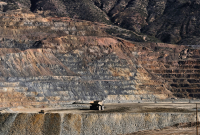Support strong Canadian climate journalism for 2025
On Oct. 20, the Panamanian government of Laurentino Cortizo and the Toronto-based copper mining company First Quantum Minerals signed a contract renewing the company's concession for another 20 years.
Since then, Panamanian society has erupted in protest.
The story has been covered by major media outlets across the world, but here in Canada? Hardly a word. This has Panamanians puzzled. It is, after all, a Canadian mining company that is the chief motive for the most important political and social crisis to rock this country in over a generation.
Every year, tens of thousands of Canadians vacation in Panama. Many of them even own property there. Today, however, the travel advisory is up and for good reason. It is impossible to travel through Panama City on account of the massive daily demonstrations. The beautiful Casco Antiguo, a favourite of tourists, is saturated with tear gas. The major highways of the country have been shut down.
In small towns and neighbourhoods, people have spontaneously gathered to sing their outrage to the rhythms of the tamboritos, the drum at the heart of Panamanian culture. On Thursday, a massive convoy of dump trucks headed into the backcountry to do what the government refuses to do: shut down First Quantum's copper mine. On Friday, a flotilla left from Colón to block the mine's port facilities on the Caribbean.
The protests have put the Panamanian government on the back foot and, in a bid to calm things down, declared a moratorium on all future mining in the country. To little effect. People are demanding the annulment of the contract and the definitive closure of the mine, or failing that, its nationalization.
All of this may seem like a lot of political heat for a copper mine. Panamanians, however, are clear about why they are in the streets: "El oro de Panamá es verde" (Panama's gold is green). They don't see this mine in their future. First Quantum's operation is a very large project, one of the largest copper mines in the Americas. It occupies the ancestral territories of the Ngäbé and the Buglé peoples.
It has punched a 6,000-hectare hole of open pits and tailings ponds in the middle of the Mesoamerican Biological Corridor. Three watersheds have been entirely ploughed under. Communities have been expelled from their homes.
But what cuts even more sharply is the fact that in 2017, Panama's highest court ruled that First Quantum's concession was unconstitutional. The passing of the contract into law has now resolved this problem for the company.
Not for the people of Panama. They are asking for something else: a country of cultural and natural riches, of living waters and forests. This mine, they say, will only leave devastation and four pennies in their pocket.
The question they ask me is: What says Canada? The Canadian embassy in Panama has given the new law its blessing, but Panamanians clearly know the difference between citizens and government. Do we support this or do we stand with the people of Panama?
It would be useful if our national media were to provide some serious attention to the case. We could then begin to make up our own minds on the subject.
As part of my job, I have been in a position to follow the story of this project closely since 2009: the destruction of the land, the disruptions to community life, the political shenanigans. Given what I've seen, I, for one, agree that another 20 years of this will only bring immeasurably more harm than good for Panama.
Daviken Studnicki-Gizbert teaches Latin American and environmental history at McGill University. He is the director of the Panama Field Study Semester and has worked with rural and indigenous communities in the area of the mine for over a dozen years.






Comments
Thank you so much Daviken and National Observer for bringing this into the light. It provides poignantly clear examples of the egregiously awful, one might even say evil, character of Canada's mining operations globally, of governments' willingness to not simply ignore but actively support these companies, and the near total apathy of canadian media to cover either. One could have a front page story every week for months just covering the monstrosity of current canadian mining operations around the world. In this case, Canada has effectively precipitated a country-wide revolt in another country, and there's hardly a sound here. Thanks again!
Indigenous communities in Argentina are desperate — their water is undrinkable. Canadian mining giant Barrick Gold has repeatedly poured millions of liters of mercury and cyanide-contaminated water into their rivers poisoning their water supply.
The Mount Polley disaster, in which Imperial Metals dumped a mind-bending 25 billion litres of toxic waste into the salmon-rich Fraser watershed. Consequences for salmon? Unfathomable. Consequences for Imperial Metals? None.
Canadian mining, the scourge of the world with unbridled unaccountability and insatiable greed, destroying Canadas image globally,
It is not Canada that is digging around the world for minerals, it is independent COMPANIES. If you have investments, YOU probably have shares in these COMPANIES, and YOU are asking them to provide YOU a high return.
COMPANIES are responsible for the bulk of the CO2 emissions (but you are also guilty for your own emissions) and they are responding to your desire to move into the electric economy by digging for the necessary critical minerals; you are even expecting a high financial return from their work. Somebody has to dig after all!
Nowadays, anyone who needs help turns to the Government and Canadian companies are no different. That does make the Canada responsible for their actions. Panamanians need to protect their environment and can make laws to that effect. That is not Canada’s responsibility.
Please, stop making everyone guilty by accusing Canada and look at your own actions.